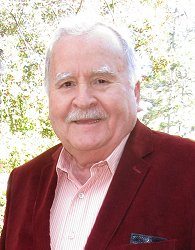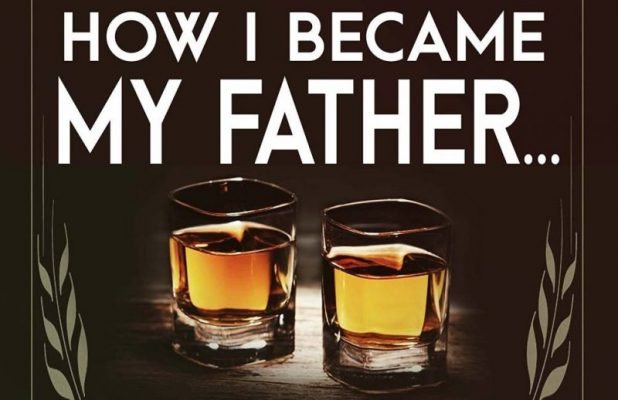Even if you don’t recognize the name William (Bill) G. Borchert immediately, it is quite likely, if you’re in recovery from alcoholism, you will have watched one of his movies, and/or read one of his books, perhaps more than once. Bill is a multi-published author, national speaker and Emmy Award nominated screenwriter for the highly acclaimed Warner Brothers/Hallmark Hall of Fame movie, “My Name Is Bill W”. It won three Emmy Awards and has become the most watched television movie ever made. Bill also wrote the screenplay for the Entertainment One/Hallmark Hall of Fame movie, “When Love Is Not Enough” which was based on his book about Lois Wilson, Co-Founder of Al-Anon and wife of Bill Wilson.
Bill began his career as a journalist in New York City, working as a reporter and writer for one of Americas most prominent daily newspapers. After working as a feature writer for national magazines and creating syndicated radio shows, Bill became a partner at Artists Entertainment Complex, an independent film production company that went on to produce a number of box office hits including “Kansas City Bomber”, “Serpico” and “Dog Day Afternoon”.
I had the privilege of interviewing Bill Borchert recently, about his remarkable life and latest book, “How I became my Father, a Drunk”, which was published in October 2015 by Story Merchant Books, Los Angeles, California. The book gives an intimate and highly emotional account of his life growing up in an alcoholic home, his own journey through alcoholism and how he overcame his difficult past, to become one of the most proactive carriers of the Twelve Step Message in modern history.
Nicola: Bill, it’s an honor to talk to you today. I appreciate you giving me your time. I’ve read many personal accounts of recovery from addiction, but this one touched me on a whole other level. I think it’s because it’s so familiar to me and triggered some deep emotion. What were the emotional challenges for you writing your entire life story – or were there any?
Bill: It was a challenge in the beginning because it wasn’t something I was planning to write – ever. It was a gentleman that I met at a convention that suggested and encouraged me to do it. Then with further encouragement from my brother, sisters and my wife, I decided to go ahead and begin writing. It was around that same time I found a cigar box that I hadn’t opened in years, belonging to my Father. It was filled with notes he wrote from his days at twelve step meetings and when I started to read through them, I realized that this was a book that God wanted me to write. Halfway through writing the book all my pain went away and it became an exhilarating experience – and eventually turned out to be a wonderful experience.
Nicola: You write in detail about very early years of your life. Was it difficult to recall those times?
Bill: What’s amazing is that sometimes I can’t remember what happened yesterday, but I can remember things from forty or fifty years ago. I also talked to my siblings if I needed clarification on anything, but mostly the memories were still vivid.
Nicola: You talk in the book about your writing as a young boy. Do you think it was a form of therapy or escape for you?
Bill: It was absolutely a form of escape. The holy sisters that taught me in school encouraged me to read and I became an avid reader. I loved to read stories about simple people who did heroic things and I could imagine myself doing them also. As I began to write it enabled me to get out of myself and be able to become other people and therefore escape the terrible things going on in my own home. It helped me a lot.
Nicola: You entered a seminary at fourteen years old with the intention of becoming an Ordained Catholic Priest. There was a comment your Uncle made to you about being able to change your mind about your decision anytime you want– and you held onto what he said and replayed that thought in your mind over the years. It suggests to me that you entered the seminary for other reasons than devotion to God. Would my assumption be right?
Bill: It turned out that when I began to get honest with myself and did an honest inventory of, I had to admit that a very large part of me going away to that seminary, was to get out of the house and get away from the situation. I loved being in the seminary. I had no home sickness. I was so happy and felt nurtured there. The trauma I experienced happened when I would come home on summer vacations. My mother noticed this and she would get very upset because I wanted to leave so soon after getting home.
Nicola: And of course that would bring up guilt feelings for you – being torn between your loyalty to your family and the need to feel safe at the seminary?
Bill: Oh yes – absolutely. But that’s how it is for children raised in alcoholic homes. There is a feeling of fear almost all the time.
Nicola: You managed to highlight the chronic co-dependency present in your entire family and how each member of the family interacted with the other. The high emotion was beautifully but painfully depicted – especially between your sister and mother.
Bill: Yes, my sister and I have talked a lot about this stuff since I wrote the book. She would constantly try to please my mother, but whatever she did it was never good enough and she could never understand why. Again in alcoholic families there is so much misdirected anger and confusion – it’s most definitely a family disease.
Nicola: It was interesting to me, that despite the discipline and praying at the seminary, you had a thought come to you that you couldn’t actually feel the presence of God – you believed He was there, but couldn’t feel Him. With the heavy reliance on a Higher Power being the central part of a twelve step path, do you think if you had felt that back then it would have steered you away from your alcoholism?
Bill: That’s a good question, but I don’t know. And the reason I don’t know – is because I’ve had a lot of friends who became priests and still wound up becoming alcoholics. When I talk to them they’ve said they didn’t really find a personal God until they entered a twelve step program. Even though they became ordained priests and served in parishes and went on missions to different parts of the world. But it wasn’t until they found twelve step that they felt connected.
Nicola: Do you think that’s because in twelve step it’s encouraged to find your own understanding of a God?
Bill: I think so, yes! Because the thing is, I didn’t find God, I was taught God. I was told this is the God I should believe in. And because of all the strictness of that God, to me everything became a sin. That’s what I became to believe. So It’s very tough to find a personal loving God when you’ve got that kind of, tsar like strictness.
Nicola: That strictness comes from your Catholic upbringing?
Bill: Yes I believe so. I’ve got what I always call a 1950’s conscience, where everything I did was wrong. I remember one day in religion class, when the sister talked about moral sin – she would walk to the boys side of the classroom. She said, if you look at a girl and have an impure thought, you can go to hell for that. And I remember the guy, McDonald was his name, sitting behind me saying “well if you can go to hell for thinking about it, you may as well go the whole way and just do it”. So there was this huge confusion and fear in my life. Even wearing patent leather shoes was a sin. So I became very confused and fearful about religion and God. In the seminary I was disappointed that I couldn’t feel the presence of God – especially because the other boys there could. So my spiritual director saw that I wasn’t developing a spiritual life you need to be a Catholic priest.
Nicola: Where do you find and feel God now?
Bill: A lot of people have said it, but I feel Him a lot at meetings. I find Him a lot through interpersonal relationships with the people that I sponsor, and now that I’ve gone back to my faith and back to church I find that I can connect to him in a way I couldn’t earlier in my life. Twelve step has enabled me to have a clearer picture of who God is. God allowed me to go through all the stuff that you read in my book in order for me to really find Him and carry His message to other people. I don’t believe that there’s a different God for everyone. God was with me every time I got into trouble. I’d be sitting at the bar and the bar tender would say – “I don’t know how you’re still alive kid” – and I’d reply – “it’s because I’ve got the Holy Ghost on my tail”.
Nicola: You seemed to have been guided by a lot of good people also, like Art McClure, your boss at one of the newspapers you worked for.
Bill: Art McClure was also a terrible drunk. He was like a father to me. He loved me to death and thought I was a great writer. Despite the fact that he was a drunk himself and had blown a big part of his career – he didn’t want me to do the same. Art still believed that alcohol was his friend in some way. That it kept him going. Yet he wanted something different for me.
Nicola: And of course there’s that romantic and sometimes chaotic correlation between the roaring drunk and the great writer. So many great writers died from alcoholism. Do you think your creativity was helped or hindered by your alcoholism?
Bill: At the time I thought I was a better writer with a few drinks – but it got to the stage where I would write something and I’d get up and couldn’t even read it the next morning. The ability to take advantage of the talent that God had given me didn’t come into play until I got sober. And it was difficult. It was not easy to write sober at first. I remember sitting at the typewriter with a blank sheet of paper and trying to put words on it and I was sweating blood because I had never done much before without a drink. I mean, I did everything with a few drinks.
Nicola: I remember beginning to write again as a sober woman, after not putting pen to paper for over fifteen years. The emotion that came up was stifling. I couldn’t get the words to make sense – Is that familiar to you?
Bill: That is absolutely, totally, familiar to me and I can relate totally. Also added to that was my low self-esteem and my terrible doubt about myself. I had gotten to a point in my life that I believed that I would never have a good life again, or accomplish again. Never again could I get a good job in the media. And so when I got sober I carried all this with me and I really didn’t think I was capable of writing anything good anymore. Thank God for my sponsor. I write about my sponsor Benny in the book. He was an incredible human being in a very simple way. He was a simple man from Brooklyn New York. He would encourage me in very simple ways – and he helped me find God again. He told me that God would not have given me these talents if I was not capable and unable to do something useful with them. It was because of him I started all over again. He would tell me all the time and I believe it to this day, that whatever we dream, we can do. God is not a big tease and he wouldn’t give us the ability to dream if it wasn’t possible to achieve those dreams.
Nicola: We always really need people on our side, like a coach when we lose that belief in ourselves, and it sounds like Benny was yours?
Bill: Yes he was definitely mine.
Nicola: So you are now fifty four years in recovery is that correct?
Bill: Yes this month – I came into recovery in March 1962.
Nicola: The miracles seem to have started for you immediately. The whole book is a real testament to the effectiveness of twelve step recovery.
Bill: Yes. There was a sequence of events that happened, that I wrote about early on in my recovery that left me in no doubt that I was being looked after by a Higher Power. I can’t find another explanation for it.
Nicola: The concept of anonymity always intrigues me, especially when it comes to people who write about their experience and share it publicly. How do you interpret anonymity and do you regard yourself as anonymous still?
Bill: I try the best I can to be anonymous at the level of press radio and film, but I’m not anonymous to people who ask me, that I’m a recovered alcoholic. I’m not at all ashamed anymore, and I know there’s still a stigma. The reason there is a stigma is because people don’t know the recovered drunks. They only know the active drunk. They see the guy falling down the street or beating his wife, but they don’t know enough sober alcoholics that have found a good life, that are successful, and getting on with things because we hold it too close to our chest. We don’t have to say we are members of Alcoholics Anonymous, or whatever twelve step group we belong to. All we have to do is say that we have recovered in a twelve step program. I can say that and it’s not breaking my anonymity.
Nicola: Right – and I feel that the misinterpretation of anonymity does hinder rather than help – would you agree?
Bill: Dr. Bob used to always say that anonymity was the most misunderstood concept of Alcoholics Anonymous. He would get very upset when people would only use their first names at meetings. He would say we shouldn’t be anonymous to each other, and we still do it. It’s nuts because people don’t understand the true concept. It’s just about not revealing the twelve step program you belong to. It’s that simple.
Nicola: So when writing the scripts for My Name Is Bill W. and Love is Not Enough, you actually met and built up a strong relationship with Lois Wilson?
Bill: Oh yes, Lois, my wife Bernadette and I were very close friends for fifteen years.
Nicola: What was she like?
Bill: Oh she was a doll. She was the most simple, humble lady you would ever want to meet and at the same time, very strong in her opinions about things. How I really got to know what she was about was this; every year she would have a picnic at her home up in Stepping Stone New York and hundreds of people would come. At the end of the picnic Lois would come back inside and people would come in and say goodbye. I was standing in the living room one time, watching this go on. They would kneel in front of her and they would kiss her and they’d be crying thanking her for saving their lives, and for the new found strength of their families. I thought to myself, even God would be pleased with this type of adulation you know? And I asked her, “Lois, how do you deal with this?” She smiled and said – “I’m gonna tell you but you still won’t understand – I am only a symbol of what they have found in Alanon”. She blew me away – she knew who she was – just a symbol.
Nicola: That’s real humility isn’t it? Reminds me of a Marianne Williamson quote where she asks “who are we not to shine?”
Bill: Yes and Lois knew you could shine as a symbol. You don’t have to pound your chest and tell the world how good you are, just shine naturally and the world will see it.
Nicola: With the array of treatment options in our modern society, do you still think that twelve step is the most effective for alcoholics?
Bill: That’s a very interesting question – and I’ll tell you why. I’m talking with a Physician right now in New York who specializes in addiction. We discussed how people have been critical of the twelve step model over the past ten or twelve years, saying it’s not science based and all that. I’m thinking about writing a book about it. We have discussed other types of treatments, and I’ve talked to others in the field also and they have come to the conclusion that the best treatment in the whole world is a twelve step program. The main reason for that is because this is a threefold disease. Mental, physical and spiritual. And while other treatments may treat the physical aspects and even the mental, there’s only one program that can treat the spiritual aspect and that’s the twelve step program. Because it is the only one that has the ability to help you find something greater than yourself.
Nicola: What do you think is the cause of alcoholism – is there a gene or is it mostly learned behavior and our environment?
Bill: I believe that it’s a combination. I have great faith in science and medical people, and especially those who are members of twelve step groups. It has been proven that there is a gene connected with alcoholism, but that’s not the whole story. The second part of the story is the environment that we grow up in. It’s a genetic link and then the environment enhances our chances of becoming alcoholic ourselves. It’s my understanding that if you have one parent who is alcoholic you have a fifty percent chance of becoming alcoholic also. If both parents are, then it rises to seventy five percent. It’s the same with drug addicts.
Nicola: Well Bill, It’s been an absolute pleasure to connect with you as a fellow writer and recovered alcoholic. The world truly has so much to learn from you. You have made me think a little deeper about writing my own story in detail – although I’m not sure I’m brave enough just yet.
Bill: I’ve thoroughly enjoyed and am so grateful for our connection Nicola. I hope you do write that book. We should never waste the talents we have been give. We should always use them to enhance the world if we can.
My brief encounter with this gentle and soft spoken, native New Yorker left me feeling privileged to have connected, almost directly, with the founders of Alanon and Alcoholics Anonymous. Bill Borchert truly carries the spirit of the original twelve step message. If you have any doubts about the effectiveness of this eighty year old solution for alcoholism, Bills Borcherts story may help to dispel them. This book is a message for the entire world. It is totally possible to recover from addiction, and for alcoholics/addicts and their families to thrive and live in peace.









8 Comments
What a fantastic interview! I love that part where Lois says that she is a symbol of what people found in Al-anon. Very powerful. Thank you for sharing this.
Paul
Thanks Paul. It was definitely an enlightening experience.
Incredible interview Nicola!! He is an amazing ambassador of 12 step recovery. And you did an outstanding piece of journalism capturing his very essence. Thank you both for carrying a clear message of hope and recovery through the 12 steps! bj
Thank you hon. It was such a natural and easy conversation to have with him and I could have talked for hours. We have so much to learn from people like Bill.
Thank you Bill for the work you have added to our lives. I got to give Louis a hug in her wheel chair at Stepping Stones Picnic in my early days of Recovery. The world of the spirit really came alive for me in their home with fellow members picnicking on the grounds while We listened with sound system wherever we sat, Alateen, Alanon, AA speakers. Amazing experience. Love to all my fellow travelers!
Nicky~I loved this interview! Thanks so so much for your awesome writing and empowering us with your writing. I love your dedication and voice!!
Love to you and thank you for all you do, I appreciate you and your hard work! Kat
The miracles in recovery never cease to amaze me. A beautiful interview with a beautiful message. Thank you for sharing this. I especially love Lois s reply about being a symbol.
I loved reading this Nicky. I remember watching ‘My Name Is Bill W.’ early in my sobriety, and it was very powerful. Fascinating interview with Bill.